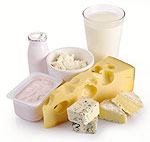 There are many additives used in the foods you eat. All are supposed to be harmless and safe for human consumption. Today’s health news is about one so called “harmless” food additive: “carrageenan.” Carrageenan is used as a thickening agent. It is processed from seaweed or algae. Food manufacturers often laud the fact that carrageenan is vegetarian unlike another popular thickening agent — gelatin — that is extracted from animal bones.
There are many additives used in the foods you eat. All are supposed to be harmless and safe for human consumption. Today’s health news is about one so called “harmless” food additive: “carrageenan.” Carrageenan is used as a thickening agent. It is processed from seaweed or algae. Food manufacturers often laud the fact that carrageenan is vegetarian unlike another popular thickening agent — gelatin — that is extracted from animal bones.
Carrageenan is often added to milk products. It also crops up in wines and beers, sliced meats, and even toothpaste. But this additive has been shown in a recent clinical trial to cause problems with insulin levels and may up your risk for getting diabetes.
Researchers at the University of Illinois in Chicago studied the impact of carrageenan on glucose tolerance, insulin sensitivity and insulin signaling in mice. They noted at the outset of the study that carrageenan is known to cause inflammation, which is associated with diabetes.
The mice were given carrageenan in their drinking water, and underwent a glucose tolerance test and an insulin tolerance test. The researchers found that glucose tolerance was significantly impaired in carrageenan-treated mice compared with untreated controls. Baseline insulin levels were also significantly higher following carrageenan treatment. Interestingly, during the insulin tolerance test, glucose levels declined by more than 80% in controls, but not in carrageenan-treated mice.
The researchers say this is the first report of the impact of carrageenan on glucose tolerance and shows that carrageenan impairs glucose tolerance, increases insulin resistance, and inhibits insulin signaling. They suggest that these effects may result from carrageenan-induced inflammation. They concluded by stating directly that carrageenan in the human diet may contribute to the development of diabetes.
If you are struggling with your blood sugar, or just want to make sure that diabetes is never a health concern for you, you may want to watch your intake of carrageenan.
For more information on food additives and how they could be affecting your health, read Migraine Sufferers Should Avoid Eating These.
